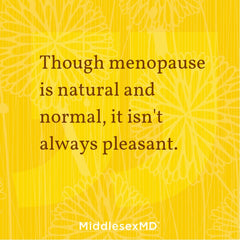Systemic Hormones
Systemic hormones are prescription hormone supplements to replace hormones we've lost.
We may have lost hormones in premature menopause brought on by the surgical removal of ovaries or when ovary function stops through chemo- or radiation therapies or, more commonly, in natural menopause. Systemic hormones are prescribed to manage symptoms of menopause. The most common symptom in menopause is hot flashes, for which hormone use is very effective treatment. Indications for use and safety is being closely studied and debated by the medical community.

Though menopause is a natural and normal process, it isn’t always a pleasant one. Women today are less able to stop their daily activities when menopausal symptoms make them feel sick or tired. For some women the symptoms are unmanageable without some treatment. When menopause symptoms threaten to disrupt your life, it is time to discuss your options with your health care provider. Hormone supplementation, through either systemic or localized delivery, is one treatment possibility. There are others.
Frequent hot flashes may disrupt sleep leading to more fatigue, another reason sex may be less interesting... as if we needed another reason at this stage of life.
Menopause symptoms alone can dampen our interest in sex. But the drop in estrogen after menopause will eventually make our genital tissues less strong, resilient, and responsive. Our vaginal tissues thin, circulation drops, and if we are not sexually active, those changes happen much more quickly. Restoring circulating estrogen increases blood flow and lubrication and tone and elasticity in the genital tissues. Together these changes improve sexual response.
How To
You can keep up to date on the latest hormone therapy research news by visiting the website of the North American Menopause Society (NAMS). If you are considering hormone therapy, we recommend you work with a menopause care provider. Find one near you in the U.S. using the physician finder at the NAMS website, menopause.org.
